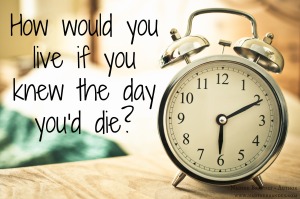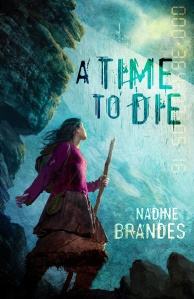This is a guest post by Nadine Brandes, the author of the newly released dystopian novel, A Time to Die.
____________
“What’s your book about?”
My most common response: “It’s like Hunger Games, only Christian.”
This is rather ironic since half the inspiration behind A Time to Die came from wanting to write a book unlike Hunger Games. Don’t get me  wrong — I devoured the Hunger Games series. I’ve watched both movies multiple times, I obsess over every released picture, trailer, or tidbit from the upcoming Mockingjay films, and I even have a mockingjay pin.
wrong — I devoured the Hunger Games series. I’ve watched both movies multiple times, I obsess over every released picture, trailer, or tidbit from the upcoming Mockingjay films, and I even have a mockingjay pin.
But, I threw book three, Mockingjay, against the wall when I finished it. Hey, I know several others who did this same thing. Maybe even you.
Why?
Because the story lacked hope. Those books progressed into a darker and darker place, ultimate ending despair with a sprinkle of bittersweet-ever-after.
That wasn’t enough for me. I needed to know that standing up for my beliefs, that striving for more, that fighting for justice was worth it. That humans could make a difference and that goodness could be found in the world.
I know Christ. I know it’s possible. So I wrote about it. Here are some similarities and differences between The Hunger Games and my own dystopian novel, A Time to Die.
Similarities
- They are both dystopian (duh)
- Both Katniss and Parvin are striving against an unjust society for the purpose of protecting the people they love.
- Both books examine the struggles that minority people groups face against a controlling government.
- The government in both books has a special power that can control the decisions and cooperation of the people. In Hunger Games it’s the Hunger Games, in A Time to Die it’s the Clocks.
- The Hunger Games is about Katniss’s external fight against her government (and her impending doom) to survive and make a change.
- A Time to Die is about Parvin interally seeking the meaning of life, trying to understand the purpose of her existence.
- The Hunger Games – Katniss draws her hope from her sister, Prim, and from her love interests, Gale and Peeta. Her hope is completely tied up in these people and of course, because they’re human, they can’t uphold that weight.
- A Time to Die – Parvin learns to draw her hope from faith in God. And, despite tragedy and the failure of humans, His power withstands the weight of human sorrow.
- In The Hunger Games, Katniss is a survivor. She’s been raised hunting, shooting and making bows and arrows. She never cries, she’s the leader of her family. This is a common trait in female dystopian protagonists, but a not-so-common trait in real teenage girls reading.
- In A Time to Die, Parvin is as human as they get. She has doubts about life, about God, about her purpose. She’s afraid, she’s never even gone camping, and she’s been raised in the comfort of home with a solid family. While she tries to be strong emotionally, she’s human and she breaks when she’s alone.
Not only is this difference in the books, but it’s a difference in our lives – in our thinking – as believers in Christ. Because Christ is my hope, it forms the stories I write. This is the beauty behind Christian fiction. I’m honored to be part of it.
What books have left you hopeful? What books have left you hopeless?
____________
To find out more about Nadine or her book, visit her at one of these places:
Blog Goodreads Amazon Facebook Twitter

I agree. I have been frustrated in this same way by many books. The problem with books like The Hunger Games is that they do an outstanding job of underscoring the problems in our lives and society, but they fail to give us clear and effective answers to those problems. They leave us better understanding what’s wrong (and that’s good), but what all of us desperately need is the solution to what’s wrong.
I’m not talking about vague solutions either. We need practical, connect-the-dots help. I have read enough of A Time to Die to realize that this is what it delivers.
I thank God for giving me another angle on the solution through Nadine…
LikeLiked by 2 people
Well said, Brent. Very well said. 🙂
I’m glad that A Time to Die is delivering another angle on the solution.
LikeLiked by 1 person
I LOVE this guest post!
LikeLiked by 1 person
Woohoo! Thanks, Laura! 🙂
LikeLiked by 1 person
I love this. It’s sad how things can be so dark! I loved Hunger Games, but I want to read A Time To Die! It also kind of annoys me how EVERY dystopian is like THG *eye roll*
LikeLiked by 1 person
I definitely agree- Mockingjay’s ending was thoroughly hopeless, and the same can be said of many other series. 😛 It’s awesome to hear about a series that, like The Lord of the Rings and the Mistborn trilogy, acknowledges that even though the world is a dark place, that doesn’t mean we have no hope.
LikeLiked by 1 person
Yeah, thank God for The Lord of the Rings! It’s sure made a big difference in my life…
LikeLiked by 1 person
The way I usually describe it, a good dystopian should end with the hope of a better world, but that may be at great cost.
The thing that let me down in the end of Mockingjay was the fact that they decided to hold one final hunger games, with the children of the oppressors. I understand the desire for revenge that they would feel, but in essence, the rebels fighting for the districts had become just as bad as those from the capital who had murdered their children.
Maybe the book was trying to make a point because in real life some revolutions do end up no better than the systems they overthrow, but I’d always prefer to see some hope in my fiction, because as you say, our faith gives us hope.
LikeLiked by 1 person
Reblogged this on Life, love, and writing and commented:
I believe the 2nd one is coming out soon, but this one is going to be put on my To be read list for sure. I love finding Christian authors!
LikeLike